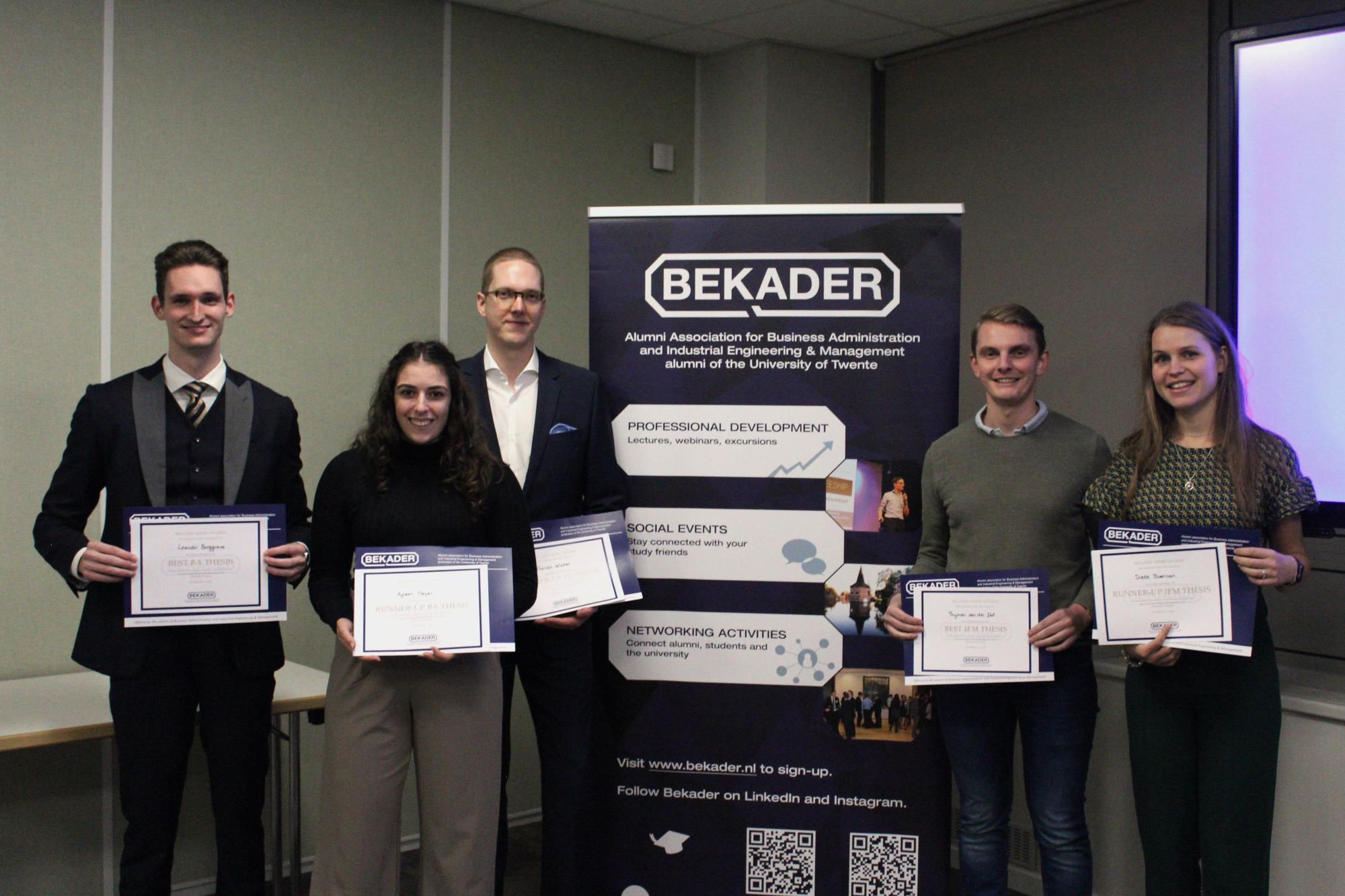
Last week, five alumni (that graduated last academic year) presented their theses for the Bekader Thesis Awards. 🏆🎓
We are proud to present to you the winners!
For BA:
1. Leander Borggreve
2. Ayleen Meyer
3. Florian Winter
For IEM:
1. Thymen van der Poll
2. Diede Boerman
A big thank you and congratulations to all finalists for your interesting talks! We hope to stay in touch through our association. 🤝
For a short summary of the different theses and a link to each full thesis, see below:
Business Administration:
- Florian Winter: In an era of digitalization, electronic word-of-mouth (eWOM) and crowdfunding disrupt existing paradigms and incorporate social information in their process of empowering consumers. Both phenomena advance the democratization of entrepreneurship with the ability to co-create innovative endeavors and, in the case of crowdfunding, even commercialize them without traditional financial intermediaries. The similarity of reward-based crowdfunding to the scenario of online purchasing constitutes an essential aspect in their interconnection. Electronic word-of-mouth may serve as an instrument for consumers to overcome information asymmetries, which is particularly critical in the context of crowdfunding and sustainability. In accordance, the relevance of eWOM in sustainable entrepreneurship is analyzed through the lens of the Elaboration Likelihood Model and the theory of signaling.
- Ayleen Meyer: My thesis focused on service design for IoT and as it turns out, service designers don’t care which technology is being used, but rather how the experience can co-create value for all stakeholders involved. However, there are still factors that can heavily influence the success of service design for IoT projects, such as the level of organizational integration, stakeholder alignment, and the tools used. Taking the findings from my research, it can be said that service design is a change agent advocating for human centered needs and personalized solutions. Service designers posses a skill set enabling them to be of value in strategic decision making and advocating for more sustainable and ethical services. The question left to answer is how to convince other business units that designers deserve a seat at the bigger table. And if service design needs to adapt to handle strategic decisions and challenges posed by new technologies.
- Leander Borggreve This study utilizes natural language processing techniques to analyze annual report narratives. The sentiment of annual report narratives is gauged by utilizing the frequency of words related to a linguistic category to establish sentiment. Consequently, investors and companies alike are advised to analyze the sentiment of annual reports, as the information included in them is likely to cause short-term adaptations in the stock price.
Industrial Engineering & Management:
- Thymen van der Poll : The thesis is about the interaction between prediction and scheduling in an online, operational, patient to location, scheduling setting.
The involved scheduling method requires multi-criteria decision making between several patients' and organizational needs, that are typically not in line.
We predict the expected utilization of practitioner schedules, and steer patient appointments intelligently towards, among others, practitioner schedules that are expected to be less utilized, without neglecting patients' needs. This reduces the variability in utilizations among practitioner schedules, and helps reaching our main goal, which is reducing the waiting time for new patients. We develop a well-performing prediction model using machine learning techniques and find after simulated evaluation that this model helps the scheduling method in reaching our goal. - Diede Boerman This thesis aims to research the complex concept of purpose-driven banking; an alternative to the traditional shareholder-oriented approach to banking. We are in an era where purpose and value become core reasons for doing business. In this thesis we increase understanding on the concept of purpose-driven banking and its main components, and provide insight in the financial performance implications of embedding a purpose-driven business model. Results suggests that purpose-driven banks have a better risk profile than non-purpose-driven banks.
Comments
Log in to read and post comments